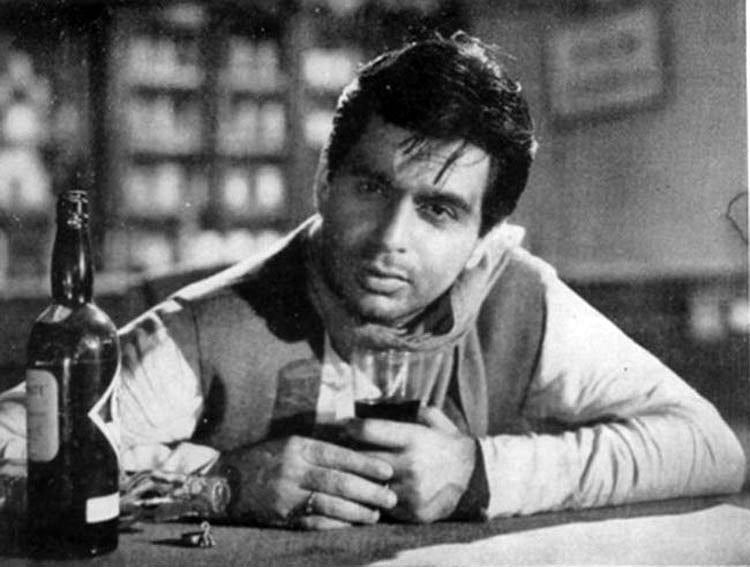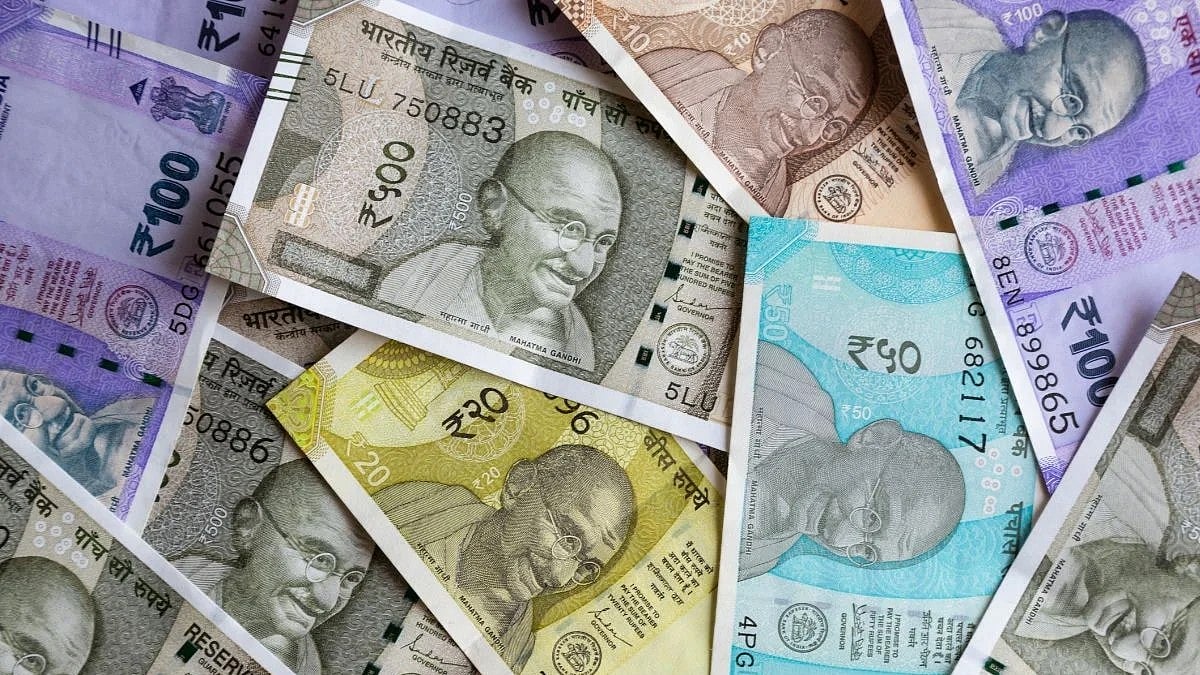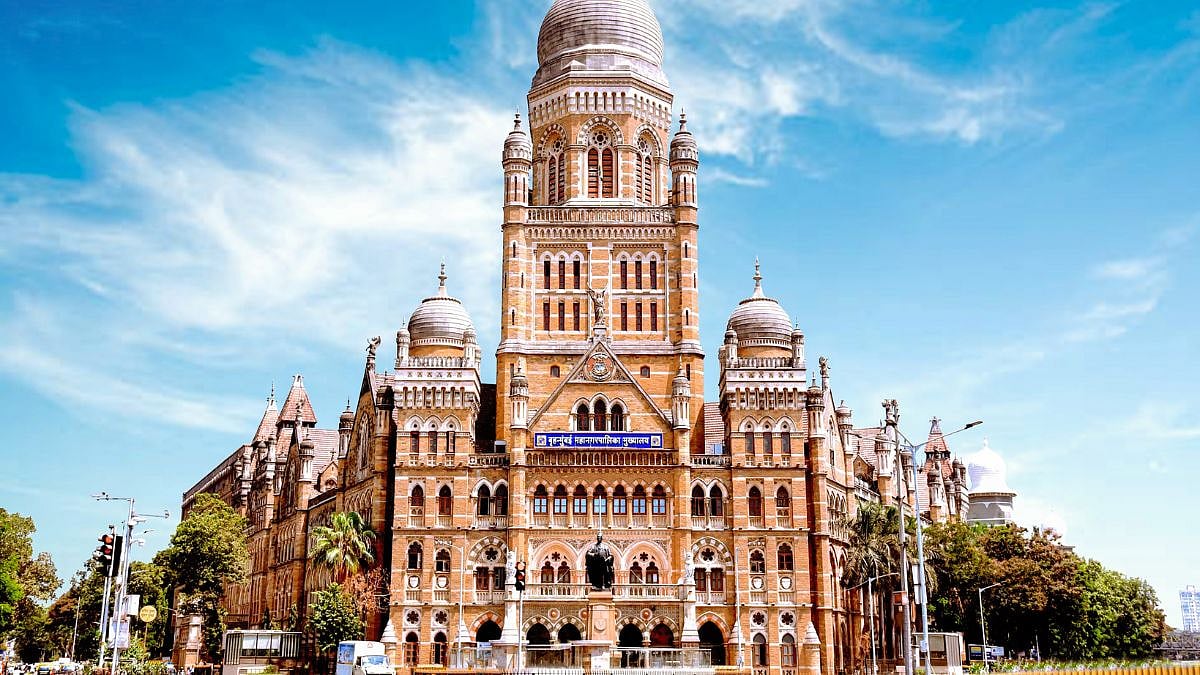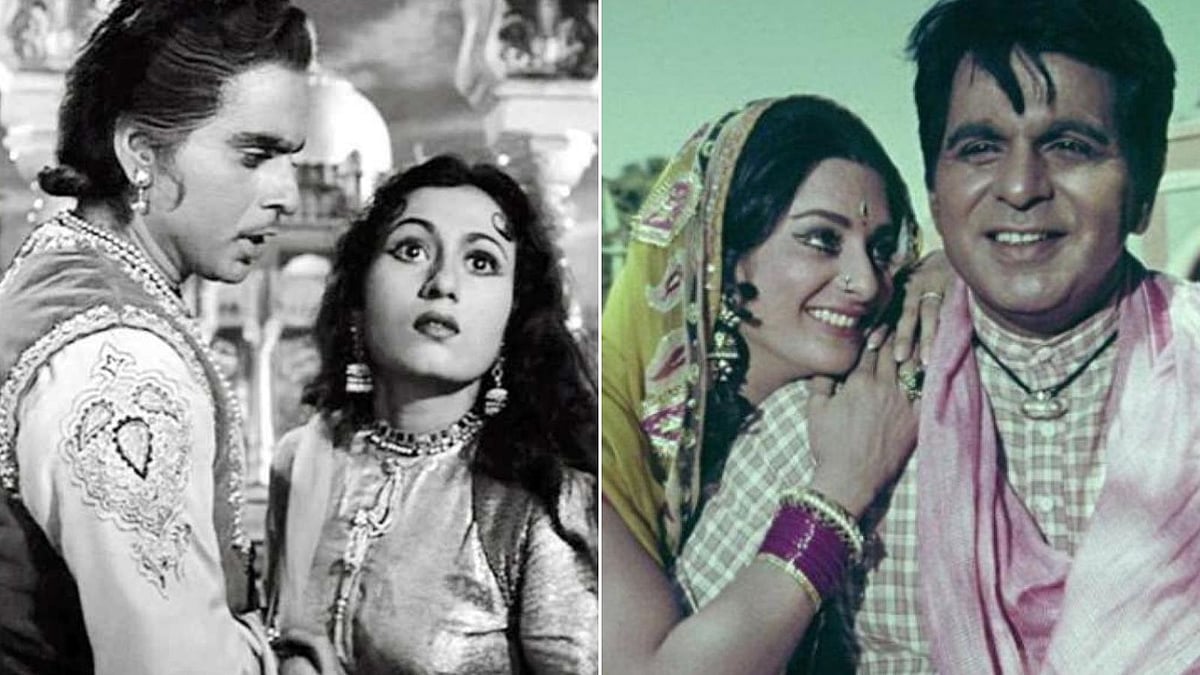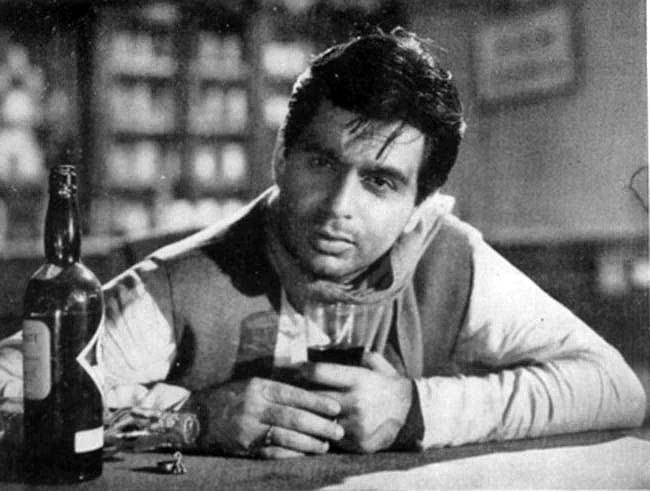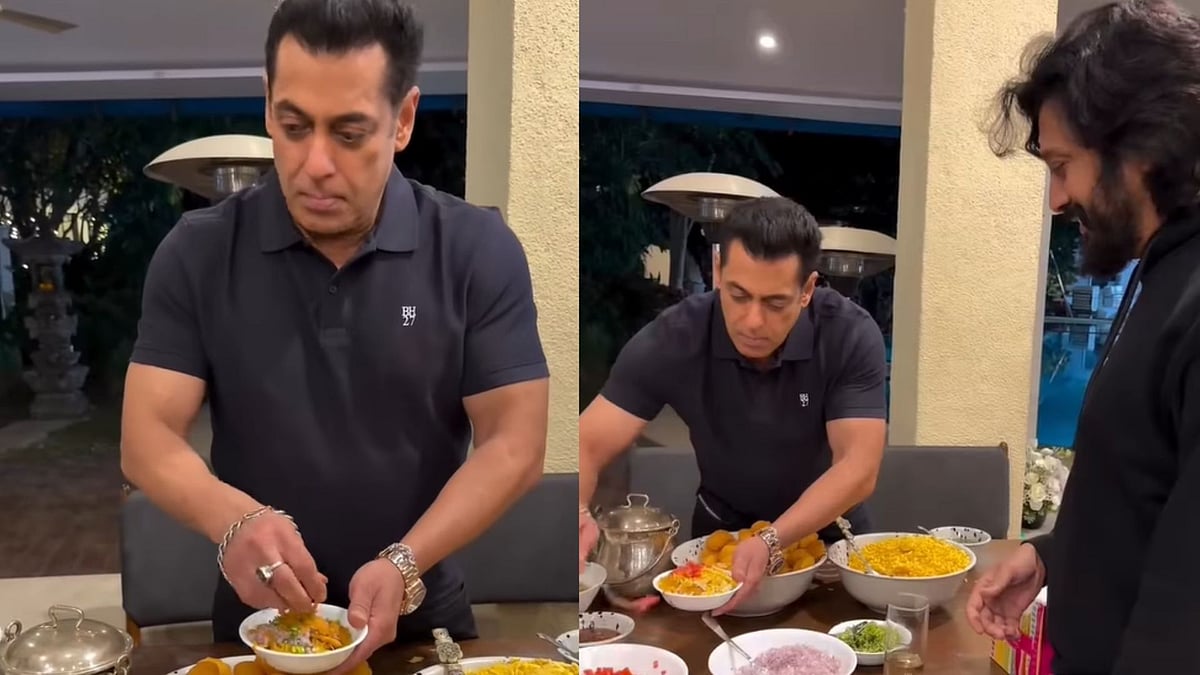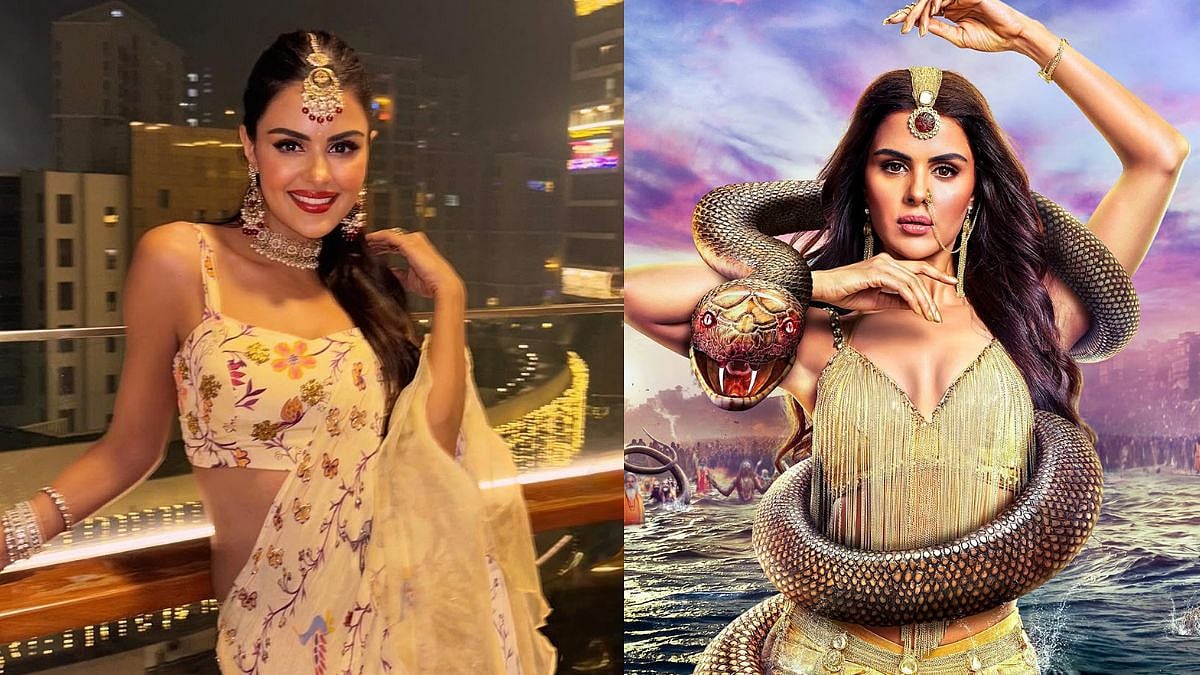An incomparable peerless aura surrounds Dilip Kumar, who lived a full life of 98 years. There can never be anyone like Dilip Kumar. He was the one and only.
In the whirlpool of emotions, which Dilip Kumar's fans hold for him, there is something deeply personal. The elderly, millennials, middle-aged men and women... there isn't anyone in this country who doesn't have a remark to share about their connect with the star.

A still from Andaz |
Jugnu in 1947 was his first commercial success. From then to Bairaag in 1976, it was Dilip Kumar all the way. While the common epithet of tragedy king is hard to ignore, Dilip Kumar's craft was way beyond a single genre. His versatility came with dollops of grace and naturalness sweeping away the audience in countless works — Andaz (1949), Jogan (1950), Deedar (1951), Tarana (1951), Footpath (1953), Amar (1954), Devdas (1955), Musafir (1957), Naya Daur (1957), Madhumati (1958), Mughal-E-Azam (1960), Ganga Jumna (1961), Dil Diya Dard Liya (1966), Aadmi (1968), followed by the second phase in '80s with Kranti, Shakti and Mashaal.
The list is long and it is never easy to create a motley list of favourites. But, here are some of his most celebrated, emotive works.

A still from Mughal-E-Azam |
Andaz was the first film where Dilip Kumar showed off his phenomenal craft. From a confident young man full of tongue and cheek humour, to a lover deeply enamoured by a beautiful woman, to his final transformation as a vulnerable, frustrated man, Dilip Kumar is incredibly varied in his range of emotions. Along with Nargis as Neena and Raj Kapoor as Rajan, Andaz by Mehboob Khan forms the ground rule for romantic Hindi cinema.
India then had just started making cinema based on newer stories and Dilip Kumar was the perfect hero. Breaking away from the theatrical tradition of performances, Dilip Kumar breathed fresh air. He was real, effortless, incredibly desirable and yet vulnerable. In Andaz, he creates this distinct language of cinematic subtlety, which was to become one of his signatures.

A still from Ganga Jumna |
Footpath, an antithesis, came four years later with Dilip Kumar playing a modest journalist who willingly takes up smuggling for a better life. It is never easy for a reigning star to pick up a role with grey shades, but Dilip Kumar did — resulting in a character, which was ahead of its times, torn between ideology and ambitions.
A scene from the Sagar Sarhadi`s film remains unforgettable where Noshu [Dilip Kumar] lays out his plan to join smuggling. The scene is set in a small hotel room where the gang meets and Dilip Kumar dashes in. His attire, his hairstyle, the way he delivers his dialogue makes the scene memorable even in 2021. Sarhadi's film didn't work at the box office, but that didn't affect Dilip Kumar's popularity.

A still from Jogan |
Over the years, Sarat Chandra Chattopadhyay's Devdas has been repeatedly adapted for the screen. In 1956, director Bimal Roy decided to make his version starring Dilip Kumar, Suchitra Sen and Motilal. Baburao Patel, the famed film critic of those days known for his unabashed style of criticism went on record saying Dilip Kumar and Devdas were synonymous. The haunting sensitivity which Dilip Kumar brought to Devdas's portrayal remains unparalleled.
In a scene from the kotha of Chandramukhi, Dilip Kumar utters perhaps the most significant dialogue of his entire career: “Kaun kambaqt hai jo bardast karne ke liye pita hai” (What a wretched man one would be to drink to drown one's sufferings).
While Rajinder Singh Bedi's dialogues are a hallmark of this melancholic tragedy, it is Dilip Kumar who immortalised those lines. Devdas puts Dilip Dilip Kumar in the seat of the ultimate tragic hero of Indian cinema, but interestingly his array of acting moves beyond.
Post Devdas, he went on to do a small budget indie film, Musafir — Hrishikesh Mukherjee's first directorial work. In this movie, Dilip Kumar shines as an enigmatic, lovelorn violinist. Such was his passion to experiment with diverse characters that he even agreed to produce the film for the debutant director.
Such experimentation would culminate in his decision to be a part of one India's biggest period films, Mughal-E-Azam. In the movie, the actor played the role of Prince Salim, the heir to the Mughal empire. An undoubted magnum opus, Mughal-e-Azam counts for the star's finesse, grace and incredible spontaneity in a fiercely dramatic love story. Much has been written about Kumar and Madhubala's chemistry, Prithvi Raj's presence and all aspects of K Asif's historical cinema, but every time the discussions end on how romantic Dilip Kumar was onscreen. And Salim's role still remains the final word for any period film.
Dilip Kumar represented a time when emotions were considered a positivity, when sentiments were not branded as mushy and grace was an added qualification for an actor. This combination made his aura, an infallible mystic that when he actually withdrew from cinema, it seemed he was never real. Such was his draw that when he reappeared briefly in his second phase, in films like Shakti, as a veteran police officer and a father unable to express his love for his gangster son, the public still vouched for Dilip Kumar's sparkling presence.
A discussion on Dilip Kumar can never end, because he is not just an actor but a state of mind, an emotion that one wants to be enveloped in. How can one tear away from that narrative!
(Nilosree Biswas is an author and filmmaker, trained in Comparative Literature from Jadavpur University, and cinema)
